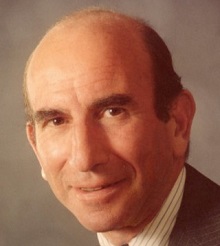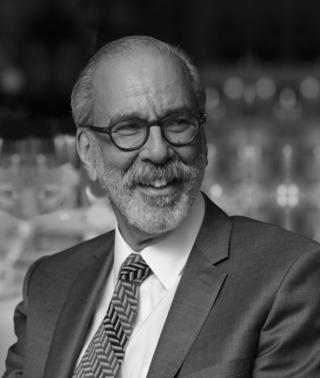Pediatric endocrinology is a medical subspecialty dealing with disorders of the endocrine glands, such as variations of physical growth and sexual development in childhood, diabetes and many more.
Kurt Hirschhorn was an Austrian-born American pediatrician, medical geneticist, and cytogeneticist who identified the chromosomal defects that underlie Wolf–Hirschhorn syndrome. He was the 2006 recipient of the John Howland Award, the highest award bestowed by the American Pediatric Society (APS).
The American Pediatric Society (APS) is the first pediatric society established in North America. Created in 1887, the APS pursues a vision of an engaged, inclusive, and impactful community of pediatric thought leaders. The APS mission is to shape the future of academic pediatrics through the engagement of distinguished child health leaders.

Melvin Malcolm Grumbach was an American pediatrician and academic who specialized in pediatric endocrinology. Called Edward B. Shaw Distinguished Professor of Pediatrics, Emeritus at the University of California, San Francisco School of Medicine, Grumbach was noted for his research and writing on the effect of hormones and the central nervous system on growth and puberty and their disorders; the function of the human sex chromosomes; and disorders of sexual development.

Martha May Eliot, was a foremost pediatrician and specialist in public health, an assistant director for WHO, and an architect of New Deal and postwar programs for maternal and child health. Her first important research, community studies of rickets in New Haven, Connecticut, and Puerto Rico, explored issues at the heart of social medicine. Together with Edwards A. Park, her research established that public health measures could prevent and reverse the early onset of rickets.

Lawson Wilkins (1894-1963) was a pioneering pediatric endocrinologist. He is known along with John Money for pioneering surgeries for visibly intersex newborns. The Pediatric Endocrine Society was founded by physicians who trained under Wilkins, and the society's name originally included a tribute to him.

Ethel Collins Dunham (1883–1969), and her life partner, Martha May Eliot, devoted their lives to the care of children. Dunham focused on premature babies and newborns, becoming chief of child development at the Children's Bureau in 1935. She established national standards for the hospital care of newborn children and expanded the scope of health care for growing youngsters by monitoring their progress in regular home visits by Children's Bureau staff.

Michael Weitzman is an American pediatrician specializing in public health and policy. He is known for his research focusing on the social and environmental determinants of child health. He has published over 150 articles in medical and scientific journals on the damaging effects of second-hand smoke, lead exposure, and countless other determinants of children's health and behavior. From 1999-2005 he served as the executive director of the Center for Child Health Research, a national research institute created by the American Academy of Pediatrics.
Clement Andrew Smith was an American pediatrician and the editor-in-chief of the journal Pediatrics. Though he did not consider himself to be a neonatologist, much of his work concerned the care of the newborn infant. He was associated with Harvard Medical School for several decades and served a term as president of the American Pediatric Society.
Edwards A. Park was an American pediatrician who established the pediatric heart disease clinic at the Johns Hopkins Hospital, along with other pediatric subspecialties. During his career, Park was Chief of Pediatrics at the Harriet Lane Home for two decades, and published articles on medical conditions such as rickets and lead poisoning. The contemporary pediatric department at Hopkins is still regulated in the same way that Park established. The Edwards A. Park Scholarship Fund at Johns Hopkins was built under his name upon his eightieth birthday by friends, colleagues and former students.
Wolf William Zuelzer was a German-American pediatric pathologist. He worked at the Children's Hospital of Michigan for 35 years, where he oversaw a large amount of pediatric research, particularly in the field of hematology. He received the John Howland Award in 1985.

Rustin McIntosh was an American pediatrician. From 1930 until 1960, he was the chief of pediatrics at the Babies Hospital of NewYork–Presbyterian Hospital and the Reuben S. Carpentier Professor of Pediatrics at Columbia University. He received the John Howland Award in 1961.

Luther Emmett Holt Jr. (1895–1974) was an American pediatrician. As a faculty member at Johns Hopkins University and later New York University, he performed extensive research in the field of pediatric nutrition. He received the John Howland Award in 1966.
Horace Louis Hodes was an American pediatrician and infectious disease researcher. He was the first to isolate rotavirus, he demonstrated that the Japanese encephalitis virus is transmitted by mosquitoes, and he discovered that vitamin D increases intestinal absorption of calcium. He spent his early career at Johns Hopkins Hospital and later became the chief of pediatrics at Mount Sinai Hospital in Manhattan and a professor at the Icahn School of Medicine at Mount Sinai.

John Howland was an American pediatrician who spent the majority of his career at Johns Hopkins Hospital, where he established the first full-time pediatric department in the United States. The John Howland Award, the highest honor given by the American Pediatric Society, is named after him.
Grover Francis Powers was an American pediatrician. He served as director of the Yale University department of pediatrics from 1927 to 1952. He won the second John Howland Award in 1953.
Joseph Dancis was an American pediatrician at Bellevue Hospital in New York City known for his research contributions to neonatology and placentology. He received the John Howland Award in 1988.
Samuel Zachary Levine was an American pediatrician who was a professor of pediatrics at Cornell University Medical College. His research focused on neonatology, particularly physiology of premature infants. He served as president of both th Society for Pediatric Research and served the American Pediatric Society.
Elena Fuentes-Afflick is an American pediatrician who is Chief of Pediatrics at the Zuckerberg San Francisco General Hospital and Vice Dean for Academic Affairs in the School of Medicine at University of California, San Francisco. She is the former President of the Society for Pediatric Research and the American Pediatric Society. In 2010 she was elected a to the National Academy of Medicine.
Daniel Cody Darrow was an American pediatrician and clinical biochemist whose research focused on fluid and electrolyte balance in the human body. He pioneered the routine use of intravenous potassium in patients after surgery, and in children with diarrhea.








